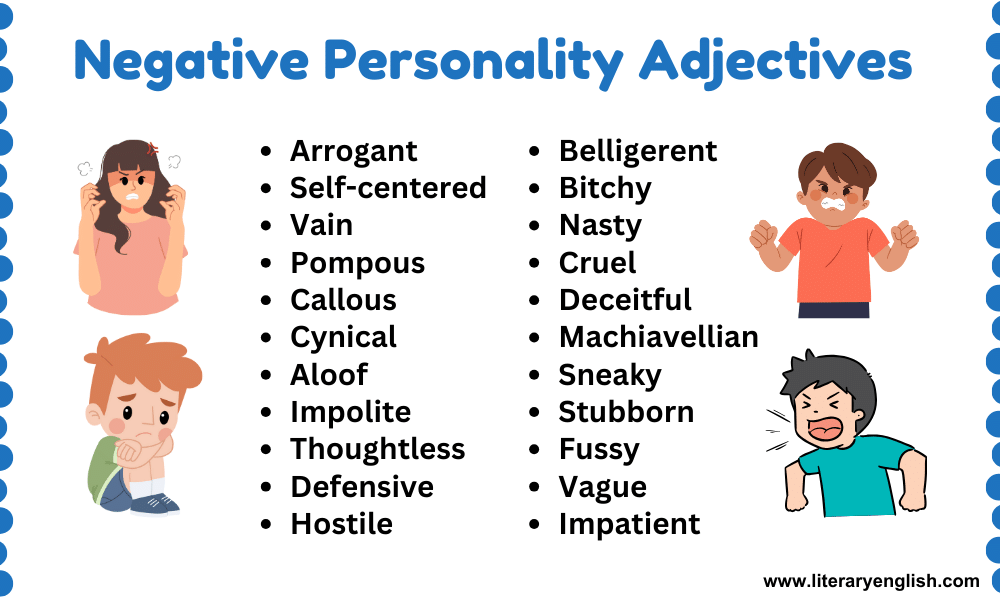What are personality adjectives?
Personality adjectives are those words that tell us about the personality traits like behavior, look, valor or temperament of a person. Negative personality adjective are used in a negative sense to degrade someone or to describe some bad trait.
Some of the most commonly used negative personality adjectives are written below.
Arrogant: Showing or revealing an exaggerated sense of one’s own abilities, Conceited, Haughty.
In a sentence: Ali got a first position in his college but he is not an arrogant about it.
Self-centered: Too much interested in him/her and not caring for others. Concerned only with one’s own needs.
In a sentence: Due to self-centered nature no one wants to join the company of Jacky.
Vain: Too much proud of one’s own ability or achievement.
In a Sentence: Joseph is very vain about his personality.
Pompous: Excessively elevated are exhibiting self importance, arrogant.
In a Sentence: The pompous waiter served us in the manner of a person doing some poor soul a great favor.
Callous: Hard-hearted, showing or feeling no sympathy for others, uncaring.
In a Sentence: Bacon is a selfish and callous man in our company.
Cynical: Peevish, having believe that all people are dishonest and selfish, skeptical.
In a Sentence: Cynical people do not believe on such as true love.
Aloof: Lonely. A man with unfriendly manner, detached.
In a Sentence: I want to keep myself aloof from politics.
Impolite: Rude, lacking politeness, ill-mannered.
In a Sentence: It is impolite to interrupt someone again and again during debate.
Thoughtless: Showing no concern for feelings or needs of other, carelessly.
In a Sentence: A thoughtless person always makes hurting comments on other.
Defensive: Behaving in a way that shows that you feel others are criticizing you. Self protective.
In a Sentence: I was surprised by his defensive arguments.
Hostile: Unfriendly, Unfreezing feeling, referring to an enemy.
In a Sentence: There was a small city that was hostile to visitor.
Belligerent: Always ready to fight, aggressive and angry, imposing war.
In a Sentence: Adam was drunk and belligerent.
Bitchy: Rude, unfriendly.
In a sentence: Boss of our company was fired out because of bitchy nature.
Nasty: Unpleasant to taste and smell or see, mean, indecent.
In a Sentence: Jane has a nasty habit of putting a finger in her mouth.
Cruel: Hurting others, causing injury, grief or pain.
In a Sentence: Injustice is a cruel fact of mankind.
Deceitful: Deceptive, misleading, a deceiving person.
In a sentence: The deceitful man neglected some hidden fault of his bike and sold it to a poor man.
Machiavellian: Using tricks in order to achieve something, dishonest.
In a Sentence: Machiavellian policy was discussed during the ring table talk.
Sneaky: Acting in a secret and dishonest manner.
In a Sentence: Many traders use sneaky ways to sell their products.
Stubborn: Refusing to change ideas or to stop doing something, obstinate.
In a Sentence: children are mostly stubborn and obstinate in nature.
Fussy: Always ready to fight, often upset or unhappy.
In a Sentence: fussy boys are always aloof because of their temperament nature.
Vague: Not clearly expressed, where meanings are not clear, doubtful.
In a Sentence: Vague answers create embarrassment during conversation.
Impatient: Unable to wait for someone or something, eager to do something without waiting.
In a Sentence: after delay to month’s salary I was impatient.
Related Posts
